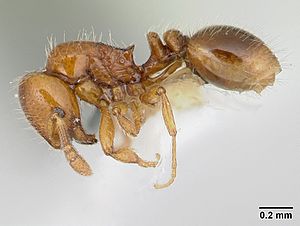Oxyepoecus bruchi facts for kids
Quick facts for kids Oxyepoecus bruchi |
|
|---|---|
 |
|
| Oxyepoecus bruchi worker | |
| Conservation status | |
| Scientific classification | |
| Kingdom: | |
| Phylum: | |
| Class: | |
| Order: | |
| Family: | |
| Subfamily: |
Myrmicinae
|
| Genus: |
Oxyepoecus
|
| Species: |
O. bruchi
|
| Binomial name | |
| Oxyepoecus bruchi Santschi, 1926
|
|
Oxyepoecus bruchi is a tiny species of ant. It belongs to the subfamily Myrmicinae. This ant is found only in Argentina, meaning it is endemic to that country.
Contents
What are Ants?
Ants are amazing insects that live in large groups. They are known for being very organized. These tiny creatures are found almost everywhere on Earth. They are a type of Hymenoptera, which also includes bees and wasps.
Ant Colonies
Ants live in special homes called colonies. A colony can have thousands or even millions of ants. Each ant has a specific job to do. This helps the whole colony survive and grow.
The Queen Ant
Every ant colony has a queen ant. She is usually the largest ant in the colony. Her main job is to lay eggs. These eggs will hatch into new ants.
Worker Ants
Most ants you see are worker ants. These are female ants that cannot reproduce. They do many important tasks for the colony. Workers search for food and build the nest. They also protect the colony from danger.
Male Ants
Male ants have wings and their main role is to mate with the queen. After mating, they usually die. They do not help with colony tasks.
Ant Nests
Ants build many different kinds of nests. Some nests are underground. Others are in trees or even inside homes. They use materials like soil, sand, or plant bits. The nest provides a safe place for the colony. It also protects the queen and young ants.
Oxyepoecus bruchi Characteristics
Oxyepoecus bruchi is a small ant. Like other ants in its subfamily, Myrmicinae, it has a two-segmented petiole. This is a narrow waist-like part of its body. This feature helps scientists identify it.
Habitat of Oxyepoecus bruchi
This ant lives in Argentina. It prefers certain environments there. Scientists study where it lives to understand its needs. Knowing its habitat helps protect the species.
Diet and Foraging
Like many ants, Oxyepoecus bruchi likely eats a varied diet. Ants often feed on small insects, seeds, or sweet liquids. They work together to find and bring food back to the nest. This food feeds the entire colony.
Reproduction and Life Cycle
The life cycle of Oxyepoecus bruchi is similar to other ants. It starts with an egg laid by the queen. The egg hatches into a larva. The larva then changes into a pupa. Finally, the pupa becomes an adult ant. This process is called complete metamorphosis.
Egg Stage
The queen lays tiny eggs. These eggs are usually white and oval-shaped. They are cared for by worker ants.
Larva Stage
When an egg hatches, it becomes a larva. Larvae are worm-like and have no legs. Worker ants feed them. They grow quickly during this stage.
Pupa Stage
After growing, the larva changes into a pupa. Pupae look like adult ants but are still and pale. Some pupae are covered in a cocoon. Inside, the ant transforms into its adult form.
Adult Ant
Once the pupa stage is complete, an adult ant emerges. These adults then take on their roles in the colony. They will live out their lives helping the colony thrive.
Why are Ants Important?
Ants play a big role in nature. They help clean up the environment. They also spread seeds and aerate the soil. This means they help plants grow. Ants are a food source for many other animals too.
See also
 In Spanish: Oxyepoecus bruchi para niños
In Spanish: Oxyepoecus bruchi para niños


